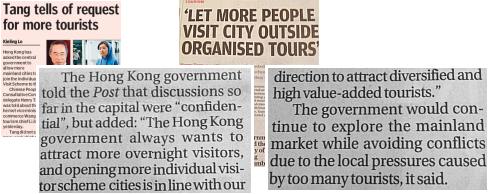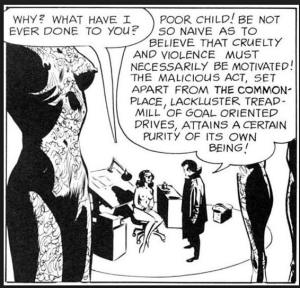Is tycoon Henry Tang secretly a supporter of Hong Kong’s localist/nativist movement? If Beijing agrees to the landlord class’s request to swamp the city with millions of additional shopper-tourists, support for the splittists will surge. It would be a gift to HK Indigenous. Given that he is not enormously good with secrets, it is likely that Henry is as he appears – simply eager to keep his buddies’ rents high.
What is interesting is the Hong Kong government response….
The official expresses a desire to attract more ‘overnight visitors’ and ‘diversified and high value-added tourists’. In other words, not cross-border smugglers and not cheapo rustic hordes who bring their own instant noodles. The spokesman also stresses the need to avoid ‘conflicts due to the local pressures caused by too many tourists’. The wording makes it clear that while the administration doesn’t want to openly reject the idea, it can’t and won’t accept it. Basically, that’s a polite ‘no’.
It is an example of Beijing’s dilemma in micro-managing Hong Kong. Well before the 1997 handover, the Communist Party started to co-opt ‘various sectors’ to form a local support base. The two most prominent of these were the cartel-running property tycoons and the New Territories’ Heung Yee Kuk power-brokers. In exchange for loyalty to Beijing and its appointed local government, these interests essentially enjoyed rent-seeking opportunities and other privileges at the expense of the rest of the economy/population. Over the years, they have acquired a massive sense of entitlement – but the rest of the population has become increasingly resentful, angry and restive. Beijing’s supposed friends are looking more like a liability.
With the Legislative Council election coming in September, the Chinese and Hong Kong governments struggle to find a balance. It is already clear that the property tycoons have been losing favour locally and in Beijing. Accustomed to having everything handed to them on a plate, they are not happy with Chief Executive CY Leung’s housing policies. And local officials have – on one or two occasions – shown signs of at least mild skepticism about the Heung Yee Kuk’s ‘traditional rights’ to grab, plunder and despoil the land.
These client groups are getting stroppy. James Tien of the pro-business Liberal Party has long been awkward in an opportunistic way. His team did not seem to do much to help Beijing’s chosen candidate in the recent NT East by-election. Nor apparently did the Heung Yee Kuk, which is threatening to launch its own party.
These grubby and selfish factions need Beijing far more than Beijing needs them. But the Hong Kong government is friendless and besieged, and the Communist Party’s local paranoiacs probably see this in terms of United Front discipline versus hostile Western-backed pro-independence insurgents. China can buy the loyalty of the tycoons and the village henchmen, yet only at the cost of – ultimately – marginalizing and alienating the population and further feeding localist sentiment.
On this occasion, the decision was simple: Henry Tang’s landlord buddies will just have to live without millions of Wuhanese peasants lining up to buy all the tacky shiny baubles on display in their malls. But the dilemma won’t go away. It will probably get more pronounced in Hong Kong, in Taiwan, and everywhere, so long as the Chinese Communist Party fails so hopelessly to figure out how to become lovable.



Flooding renegade provinces with Han works. Look at Tibet. look at Xinjiang. The next lot won’t be shopping, they’ll be moving in. You heard it here first.
Expect more Putonghua on the staircase, even in Soho.
Head to the hillls or at least a country park without offensive anti-government graffiti.
It is evident that John Tsang is the favoured candidate of the tycoons. He’s a marginally cuddlier pliable civil servant in the mold of Donald Tsang who will let them rip off the population with impunity. That leaves the rest of us between a rock and a hard place. If we get Pornstache Tsang as the next CE, we’re screwed in the wallet. We get another 5 years of 689, we’re screwed in rather more uncomfortable parts of the anatomy.
@” Over the years, they (tycoons ) have acquired a massive sense of entitlement – but the rest of the population has become increasingly resentful, angry and restive.
……..skepticism about the Heung Yee Kuk’s ‘traditional rights’ to grab, plunder and despoil the land……….the pro-business Liberal Party has long been awkward in an opportunistic way. These grubby and selfish factions need Beijing far more than Beijing needs them. ”
Good God Hemmers you really are now sounding like a good card-carrying socialist (they used to call us communists and some still do, unable to recognize how the CP has morphed.).
and @ ” But the dilemma won’t go away……. so long as the Chinese Communist Party fails so hopelessly to figure out how to become lovable.”
Well there is simple answer to this problem if it really is one; on the other side of our SAR boundary more than 1.3 billion live relatively content with their government which still enjoys the Mandate of Heaven, basically by providing a fairer share to all of China’s growing wealth, unlike Hong Kong.
Quoting Ronald Reagan ‘Tear down that wall’ (the boundary fence) and all be solved. You might consider the other side are rather too ‘left” but given time we shall also drive on the right. I shall also be able to watch TVB news with simplified Chinese characters without my splittist neighbours getting their knickers in twist
@ Enid Criswel ” Expect more Putonghua on the staircase, even in Soho.”
Well that will be a pleasant relief from Geordie and Scouse
As soon as Mr Pringles becomes CEO he can show his goodwill towards the people and ‘tear down that wall’ around LegCo and Civil Square.
The definition of “socialist” really has taken a battering lately. Who’d have thought a fascist state premised on thuggery and duplicity would qualify? Then again, the CCP thinks “democratic dictatorship” makes sense.
Still, great to hear its population is “relatively content” even though a “moderately prosperous society” remains on the to-do list. Despite all HK’s economic distortions, I note China’s Gini coefficient is worse.
In fact, China has the 28th-worst income disparity between the top and bottom 10% of the population. Most of the countries above it on the list are rogue states or military dictatorships, for some unfathomable reason.
I know we shouldn’t feed the troll but I’m bored and it’s all a bit quiet here today.
@ Enid, don’t forget Taiwan. Beijing says it will build high speed rail to Taipei by 2030. Taipei says “what?” https://thenanfang.com/374142-2/
The Mainland CCP gangster state accumulates wealth in the hands of CCP related people. The skewing of wealth and theft is just a state secret that the CCP won’t let be reported or commented on
Qian Jin must be getting desperate. His comments are increasingly detached from what any of the rest of us would recognise as reality. Citizens of any state protected by censorship from a realistic view of the outside world will tend to believe the propaganda they are fed about how lucky they are.
Our people survived Shatin, so blah blah: HKitis again!
I sometimes wonder why people bother to do content-free D. Ed.’s at third-world seats of learning, but I think I know the answer now. It’s so they know how to do curly quotes, sort of.
“Grab, plunder and despoil the land”? Despite your huge talent at political dissection, old bean, you wouldn’t last five minutes among the great unwashed. One destroys first.
The censorship and propaganda isn’t even all that effective. The official number of “mass incidents” in China – protest gatherings of more than 100 people – increased from 32,000 in 1999 to more than 180,000 in 2010.
Since then, coinciding with Xi’s war on liberal thinking and civil society, even that official statistic has been censored. Meanwhile, an immeasurable quantity of independent thought has shifted to the online battlefield.